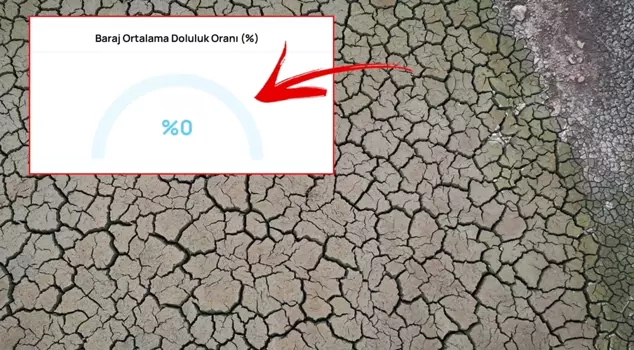
17.10.2025 17:03
The average dam water level in Bursa has dropped to zero percent. The Nilüfer and Doğancı dams, which supply the most important part of the city's drinking water, have dried up. Murat Demir, the president of DOĞADER, stated that wild irrigation is being practiced in the city, and said, "If this problem continues in the coming days, we will no longer see vegetables and fruits like tomatoes, eggplants, and peaches on our tables."
```html
Due to the drought caused by global warming, the water of 'Green Bursa' has completely run out after weeks of planned water cuts. In the city, known as the "water city," the average filling rate of the dams has reached zero percent.
THE DAMS HAVE COMPLETELY DRIED UP
The Nilüfer and Doğancı dams, which supply the most important part of Bursa's drinking water, have dried up.
There is no water left in the Nilüfer dam with a capacity of 60 million cubic meters, which provides water to the districts of Yıldırım, Nilüfer, Osmangazi, Gürsu, Kestel, and part of the Mudanya district, and the Doğancı dam with a capacity of 125 million cubic meters.
The filling rate, which was 2.33% on September 28, was measured at 0.49% on October 12, 0.15% on October 15, and as of yesterday, it was measured at 0%.
Some of the daily water needs of the relevant districts, which is around 400-500 thousand cubic meters, is being attempted to be met with 100 thousand cubic meters of water taken from the Çınarcık Dam, wells, and spring sources.
In Bursa, with a population exceeding 3 million, 525 thousand cubic meters of water is consumed daily.
PLANNED WATER CUTS ARE BEING IMPLEMENTED
Bursa Metropolitan Municipality's subsidiary, Bursa Water and Sewerage Administration (BUSKİ), has been implementing planned water cuts for 12 hours in the districts of Osmangazi, Yıldırım, Nilüfer, Mudanya, Gürsu, and Kestel since October 1.
AGRICULTURE IS IN DANGER
The ongoing water crisis is negatively affecting agriculture in Bursa, which supplies a significant portion of Turkey's vegetable and fruit needs. Many fruits and vegetables such as peaches, pears, figs, cherries, olives, strawberries, grapes, walnuts, Brussels sprouts, artichokes, tomatoes, and beans grown in the Bursa Plain are sent to many provinces in Turkey, and if the drought continues, it is suggested that production in the agricultural city of Bursa may face difficulties.
"WE WILL NO LONGER SEE VEGETABLES AND FRUITS ON OUR TABLES"
Murat Demir, the President of the Nature and Environment Protection Association (DOĞADER), stated that the ongoing drought is also affecting agriculture, saying, "Water in Bursa is not only for drinking but also very important for Turkey's vegetable and fruit needs. The drying of lakes and dams due to drought poses a serious threat. If this problem continues in the coming days, we will no longer see vegetables and fruits such as tomatoes, eggplants, and peaches on our tables. As you know, agriculture requires a significant amount of water. Here, of course, it is necessary to change the water usage methods and irrigation methods used in agriculture as a precaution. The wild irrigation method known as flood irrigation is being practiced in Bursa. This should be abandoned and intervened. With the support of the state and local governments, opportunities should be provided for farmers and those engaged in agriculture to implement drip irrigation and rain-fed irrigation, and incentives should be given, and support should be provided," he said.
Source: AA, DHA
```